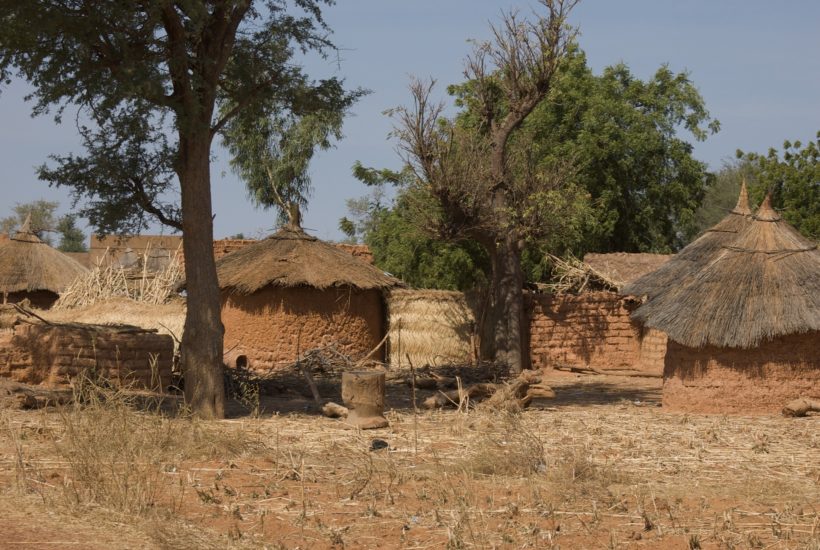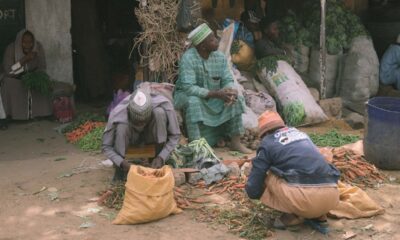Africa
The Nubian vault technique could help Burkina Faso’s economy
A very old technique of building ecological houses, the Nubian vault, is now promoted in Burkina Faso by an association. The association now claims 900 trained and active workers in West Africa. Ambassadors are ready to make the Nubian vaulting technique known and, in turn, to train masons. This would help the local economy which is very affected by the coronavirus crisis.

Ecological, economical, and comfortable, mud houses are also a driving force for the local economy in Burkina Faso. The challenge is huge in West Africa, where everyone dreams of a solid cinder block house, even if it means living under an expensive and uncomfortable corrugated iron roof.
Since 1998, Thomas Granier and Séri Youlou, a Frenchman and a Burkinabe, have been promoting a thousand-year-old technique: the Nubian vault. Born in Upper Egypt and unknown in the rest of Africa, “the Nubian vault technique makes it possible to build houses with vaulted roofs without formwork, using local materials, basic tools and relatively simple technical skills,” explained the site of the two companions.
If you want to find out how an association in Burkina Faso is trying to promote the Nubian vault technique of building houses and help the local economy, download the Born2invest mobile app. Read the latest economic news from around the world with our companion app.
Their association won the 2020 Grand Prix for urban innovation from Le Monde-Cities
In 20 years of existence, the association has completed nearly 4,000 projects in West Africa, including 700 in the 2019-2020 construction season alone. Houses, but also schools and places of worship. Contrary to popular belief, the earth is no less solid than cinder block. In addition, according to its designers, a Nubian vaulted dwelling can be passed down over several generations.
This type of construction seems to have only advantages. No wood, when the resource is scarce due to deforestation, no imported materials such as sheet metal, cement or steel. The mud bricks that make up the bulk of the construction, from walls to roof, are made on site or nearby. The stone for the foundations is also cut close to the building site.
With thick walls to support the vault, small openings and a roof covered with earth to ensure water tightness, the house is also better insulated from the heat of the Sahel. The well-mastered technique makes it possible to build an extra storey above the vault.
The association works on the principle of passing on the knowledge
The target audience is primarily rural. Because they are poor, people are increasingly turning to precarious shelters made of sheet metal and tarpaulins. However, the earth is abundant and the brick dried in the sun costs only the effort of shaping it. Community self-help may very well make it possible to pay for labor in exchange for another service. Thus, according to its designers, the cost of a house is 30% to 50% less than using cinder blocks.
The association’s guiding principle is the desire to pass on know-how by training masons on the building sites in this new technique. In 2016, Seri Youlou recounted his experience on the Solidarum site. “For the farmers, it was not easy to accept a construction without wood, straw or sheet metal. So we told the first interested farmer: ‘If you can bring the material (earth, rocks), we will build your house and at the same time we will find someone to train in the village to do it with us, and your house will be the model house.'”
Building houses by using the Nubian vaulting technique is economically viable
The association now claims 900 trained and active workers in West Africa. Ambassadors are ready to make the Nubian vaulting technique known and, in turn, to train masons. Because it is not about humanitarian work there. The ultimate goal is to establish a viable ecosystem around the construction of these houses. Only the market economy can validate the merits of the approach.
__
(Featured image by imodeen via Pixabay)
DISCLAIMER: This article was written by a third party contributor and does not reflect the opinion of Born2Invest, its management, staff or its associates. Please review our disclaimer for more information.
This article may include forward-looking statements. These forward-looking statements generally are identified by the words “believe,” “project,” “estimate,” “become,” “plan,” “will,” and similar expressions. These forward-looking statements involve known and unknown risks as well as uncertainties, including those discussed in the following cautionary statements and elsewhere in this article and on this site. Although the Company may believe that its expectations are based on reasonable assumptions, the actual results that the Company may achieve may differ materially from any forward-looking statements, which reflect the opinions of the management of the Company only as of the date hereof. Additionally, please make sure to read these important disclosures.
First published in franceinfo:, a third-party contributor translated and adapted the article from the original. In case of discrepancy, the original will prevail.
Although we made reasonable efforts to provide accurate translations, some parts may be incorrect. Born2Invest assumes no responsibility for errors, omissions or ambiguities in the translations provided on this website. Any person or entity relying on translated content does so at their own risk. Born2Invest is not responsible for losses caused by such reliance on the accuracy or reliability of translated information. If you wish to report an error or inaccuracy in the translation, we encourage you to contact us.

-

 Markets5 days ago
Markets5 days agoCoffee Prices Decline Amid Rising Supply and Mixed Harvest Outlooks
-

 Crypto2 weeks ago
Crypto2 weeks agoBitcoin Recovers After U.S. Strikes Iran, While Altcoins Face Sharp Losses
-

 Crypto2 days ago
Crypto2 days agoCaution Prevails as Bitcoin Nears All-Time High
-

 Africa1 week ago
Africa1 week agoMorocco’s Wheat Dependency Persists Despite Improved Harvest
























